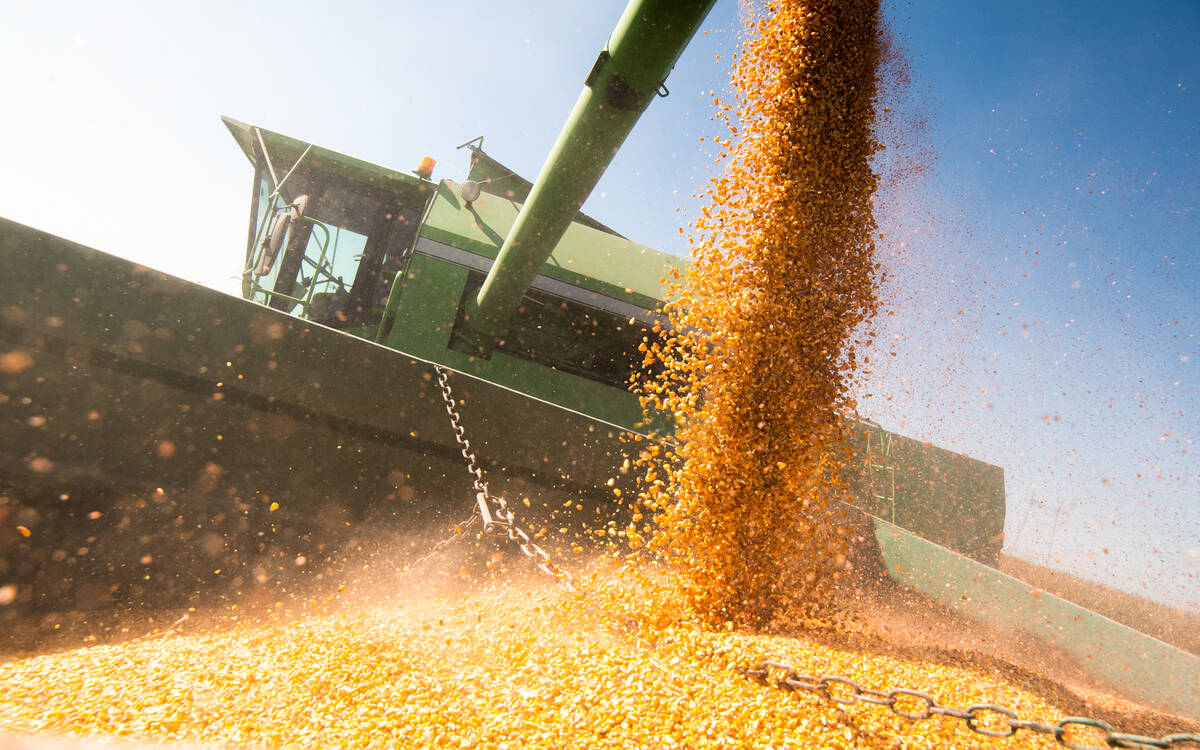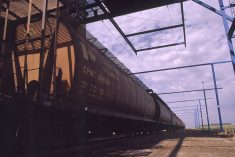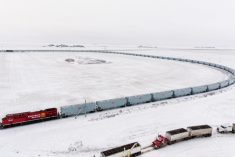Long-awaited amendments to the Canada Transportation Act that Prairie grain farmers and shippers hope will result in better rail service were tabled Tuesday in the House of Commons.
At press time Tuesday farm organization and grain company officials were still assessing Bill C-49, which also deals with other transportation issues, including air travel.
At first blush the Alberta Wheat Commission (AWC), for one, liked what it saw.
The 72-page bill includes measures to make a more transparent, fair and efficient rail system, federal Agriculture Minister Lawrence MacAulay said in a release.
Read Also

Feed Grain Weekly: Corn affecting barley prices in Lethbridge
Corn imports entering Lethbridge have lowered prices for feed barley compared to those in Edmonton.
The legislation addresses many grain industry priorities, including reciprocal penalties for when the railways fail to meet service obligations, a definition of “adequate and suitable” rail service, maintaining and modernizing the Maximum Revenue Entitlement (MRE) and a new long-haul interswitching provision, MacAulay said.
“AWC believes the legislation will go a long way to providing long-term solutions to rail transportation challenges that Canadian farmers have faced for decades,” AWC general manager Tom Steve wrote in an email.
“We like the focus on provisions aimed at improving railway accountability including reciprocal penalties, better definition of adequate and suitable service and long haul interswitching. We will be seeking further clarity on how these measures will be implemented. It also appears the MRE will be retained with a proposed change in the cost index to individual railways.”
Most farm groups and shippers have said they would support tweaking the MRE, including changes that would accurately reflect each railway’s purchase of new hopper cars.
Under the current structure, if one railway buys 1,000 cars and the other doesn’t, the buying railway only gets half the benefit by having its entitlement increased, while the non-buying railway gets the other half.
The MRE gives the railways freight rate flexibility to encourage grain shippers to be efficient, but it also allows the railways to earn a fair return from hauling grain while protecting farmers from price gouging in what most observers agree is not a competitive market.
The entitlement is adjusted annually to reflect higher railway costs, the volume of grain hauled and the distance.
Pulse Canada also noted, however, that the new bill proposes to remove containerized grain from the MRE calculation.
Since the pulse and special crop sector largely relies on intermodal shipping for export, “we will look closely at this change to the MRE to understand both what the government intends as an outcome and the impact on our industry,” Pulse Canada CEO Gordon Bacon said in a release Tuesday.
“The industry expectation is that change must lead to improved containerized service, capacity and performance at competitive rates. Having clearly defined performance measures in place will be key to determining if the removal of container traffic from the MRE has achieved the intended results.”
The proposed new long-haul interswitching option is expected to be welcomed by grain companies and farmers.
Interswitching allows one railway to move goods from a competitor’s line and is meant to encourage competition.
C-49 proposes under certain circumstances, interswitching distances be increased to 1,200 km instead of the current 160 km — a temporary measure introduced in 2014 under the Fair Rail for Farmers Act, set to expire Aug. 1. The standard interswitching distance had been 30 km.
The railways, which had not issued a statement on the bill at press time, have long opposed additional regulation, saying it would discourage investment in a capital intensive business.
Cam Dahl, president of Cereals Canada, said the new bill “will help correct the imbalance between the market power of the railways and captive shippers.”
The Prairie grain industry, he said, is “captive to monopoly carriers,” making it “good economic policy for legislation to balance this market power through measures that mimic what would occur if there were open competition.”
Observers doubt the bill will be law by Aug. 1 so some farm groups want the Fair Rail for Farmers Act extended in the interim.
MacAulay also announced a fourth mandate for the Crop Logistics Working group, a forum of industry representatives who identify supply chain challenges and opportunities. Agriculture and Agri-Food Canada will provide a government co-chair.
The Grain Monitoring Program, introduced in 2000 to independently measure the efficiency of the West’s grain pipeline, will continue another three years, MacAulay said.
Scott Streiner, CEO of the Canadian Transportation Agency, said Tuesday the CTA is “making preparations to ensure the timely, fair, and effective implementation of updated legislation. This includes plans to consult stakeholders, experts and Canadians in general on the new regulations.”
“There is a lot to assess in this bill and our team will do a thorough analysis of the details and will be prepared to participate in the parliamentary process over the coming months,” Lee Moats, chair of Pulse Canada, said Tuesday.
“In the end though, it’s about results. The true measure of success is the extent to which these provisions deliver measurable improvements in performance.”
— Allan Dawson is a reporter for the Manitoba Co-operator at Miami, Man. Follow him at @AllanReporter on Twitter. Includes files from AGCanada.com Network staff.
















